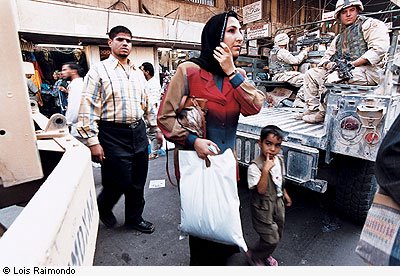2003
UNMOVIC weapons inspectors led by Dr Hans Blix report limited co-operation in their search for WMD. America and Britain call for a new UN resolution authorising war and get backing of Spain and Bulgaria. But France, Russia, China, Germany and Syria are opposed. America sends 225,000 troops to the Gulf and Britain commits 45,000.
A 21-day conflict ends on April 11 with the fall of Baghdad. Saddam's whereabouts are unknown but his sons, Uday and Qusay, are later killed during a US-led raid on a house in Mosul. In October, an interim report by David Kay, the head of a CIA-led inspection team, shows that after four months of searching, no banned weapons have been found.
The hunt for the 'Ace of Spades' ends on December 14 when Saddam Hussein is captured by US forces at his cramped, 8ft-deep hideaway under the floor of a mud hut on the outskirts of his home town, Tikrit.
2004
April sees the coalition tainted by revelations of prisoner abuse, most notably at Abu Ghraib prison.
In an effort to thwart terrorist attacks, the Coalition hands over sovereignty one day ahead of the June 30 deadline.
Saddam Hussein appears before an Iraqi judge. The pictures are shown on television worldwide, stunning Iraqis. Six days later, Tony Blair admits that WMDs may never be found.
American and Iraqi forces carry out a two-week operation in Fallujah in November to flush out insurgents.
2005 Eight million Iraqis defy the insurgents' bombs and go to the polls in the first free elections for five decades on Jan 30. Dozens are killed in suicide attacks, but a Shia-led government is elected.
Ten servicemen are killed when a Royal Air Force Hercules aircraft crashed near Baghdad the day of the elections.
Three soldiers who abused prisoners at an Iraqi aid centre, Camp Breadbasket, are jailed and thrown out of the Army in disgrace.
Iraq's new government finally agrees on who will fill the remaining cabinet posts, months after the Jan 30 elections.
Pictures of Saddam Hussein in his underpants, taken in his prison cell, are published in The Sun newspaper.
Abu Musab al-Zarqawi, the leader of the al-Qa'eda wing in Iraq, is reported to have been wounded.
Iraq's new government, responding to allegations of weakness, deploys 40,000 troops in a ring of steel around the capital in the largest indigenous security operation since the fall of Saddam Hussein.
Nearly 25,000 Iraqi civilians have died in the two years since US and British troops invaded Iraq - an average of 34 people a day - according to figures published by British academics.
The constitutional committee fails twice to meet deadlines for agreement on a new constitution. On August 15 they give themselves an extra week to strike a deal, but still fail because of religious and ethnic differences. They give themselves an extra three days. The main sticking point is federalism.
Iraqi politicians miss the third and final deadline for agreeing a new draft constitution. The August 25, 2005, deadline collapsed amid acrimony and violence between the different religious and ethnic groups. The Sunnis (who do not want a constitution) had accused the Shia negotiating group of failing to turn up for talks, while the government's official spokesman said a final version had been decided upon and a compromise reached on three issues - without naming them.
Up to 1,000 Iraqis die in a stampede caused by rumours of a suicide bomber during a religious ceremony in Baghdad.
Two British soldiers are killed when a roadside bomb explodes beside their armoured Land Rover while on patrol near Basra.
The court martial of seven British soldiers accused of a "unjustified" and "unprovoked" attack on a group Iraqi civilians begins in Essex.
A year-long investigation, overseen by the former US Federal Reserve chairman, Paul Volcker, concludes that the UN was guilty of "illicit, unethical and corrupt behaviour" in its handling of the oil-for-food programme in Iraq. Kofi Annan accepts responsibility for the "embarrassing failings", but refuses to resign.
Iraq's president claims on television that Saddam Hussein has confessed to killings conducted while his Ba'athist regime held power, but the allegation is denied by the former president's lawyers.
A huge force of American and Iraqi troops storm the narrow alleyways of a rebel-held "funnel of death", in one of the biggest anti-insurgency operations since the siege of Fallujah.
Abu Musab al-Zarqawi, al-Qa'eda's leader in Iraq, declared "all-out war" on the country's Shia population as the organisation claimed responsibilty for a campaign of suicide attacks which killed at least 152 people. It was the second-most deadly day of insurgent violence since the fall of Saddam Hussein.
Related links
Iraq factfile
http://www.telegraph.co.uk/news/main.jhtml?xml=/news/campaigns/iraq/ffiraqtime.xml#war




